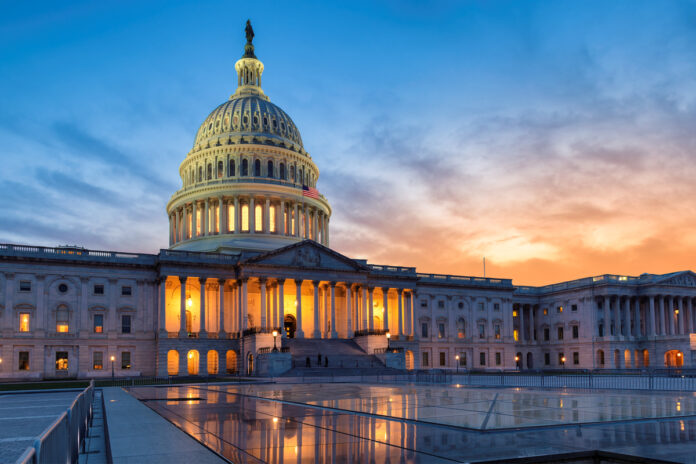WASHINGTON, D.C. – Prominent Senators Cory Booker (D-N.J.), Ron Wyden (D-Ore.), and Chuck Schumer (D-N.Y.) issued a joint statement confirming they will push to further legislation that would legalize cannabis on a federal level.
“The war on drugs has been a war on people—particularly people of color. Ending the federal marijuana prohibition is necessary to right the wrongs of this failed war and end decades of harm inflicted on communities of color across the country. But that alone is not enough. As states continue to legalize marijuana, we must also enact measures that will lift up people who were unfairly targeted in the war on drugs,” the statement read.
Schumer, who became Senate Majority Leader on January 20, co-sponsored legislation in 2018 that supported decriminalizing cannabis. More recently, he said he would support federal legalization and allowing states to use cannabis tax revenue to address social inequities and support communities in need.
Wyden and Booker both have authored pro-legal cannabis legislation. Booker, an outspoken cannabis advocate, introduced the Marijuana Justice Act in 2019, which would legalize cannabis in the U.S., as well as expunge federal convictions for previous cannabis offenses and provide resources for communities that have suffered from the effects of the war on drugs. Wyden authored a taxation and regulatory structure outline for cannabis products, titled the Marijuana Revenue and Regulation Act. Wyden also is chairman of the Senate finance committee.
“We are committed to working together to put forward and advance comprehensive cannabis reform legislation that will not only turn the page on this sad chapter in American history, but also undo the devastating consequences of these discriminatory policies. The Senate will make consideration of these reforms a priority,” the joint statement continued.
“In the early part of this year, we will release a unified discussion draft on comprehensive reform to ensure restorative justice, protect public health, and implement responsible taxes and regulations. Getting input from stakeholder groups will be an important part of developing this critical legislation,” they said.
Cannabis industry members have been cautiously optimistic since the Biden administration win in November. The U.S. House, in lame duck session, approved the Marijuana Opportunity Reinvestment and Expungement Act (The MORE Act), but it was blocked in the Republican-held Senate.
The MORE Act would “decriminalize cannabis and expunge convictions for non-violent cannabis offenses that have prevented many Americans from getting jobs, applying for credit and loans, and accessing opportunities that make it possible to get ahead in our economy,” House Majority Leader Steny Hoyer (D-Md.) said at the time.
Political pundits, stock speculators, and industry players have speculated U.S. lawmakers will be pressured to legalize cannabis in order to help the coronavirus-devastated economy back to its feet with an emergent industry that can provide thousands of jobs in several industrial sectors. Medical and legal recreational cannabis businesses proved “essential” in the pandemic and somewhat inflation-proof, unlike some long-established industries that crumbled under global lockdowns.
On a global level, other countries that have more rapidly entered cannabis markets, including Canada, are setting the curve for international trade.
Brendan Kennedy, chief executive officer for Canadian cannabis multinational Tilray said last week that he is bullish on the American cannabis industry and federal legalization.
“I expect that pressure from the North and the South will ultimately lead the U.S. to implement a federal program here at some point in the next eighteen to twenty-four months,” he told financial news outlet CNBC’s “Squawk on the Street” podcast.
The comment followed an announcement by Tilray that the company will supply medical cannabis to researchers in France with the agency that sets safety standards for medicines and healthcare products. Tilray also has been exporting product to Germany since 2017. The company currently has production licenses in Canada and Portugal.
Social unrest throughout 2020 also brought social equity issues into the spotlight. Nonprofit organization Last Prisoner Project has raised awareness about the disproportionate negative effects of marijuana and drug convictions on communities of color, particularly Black Americans.
The nonprofit also worked with many cannabis industry leaders and companies for fundraising and to advocate for justice reform. With Democrats in support of progressive social policies, cannabis-related calls for equity in business and for communities have new “lobbying clout,” according to financial news outlet Bloomberg.com.
“As the Black Lives Matter movement has risen in prominence, social justice arguments to legalize cannabis have gained more lobbying clout. Grants have been proposed as a way to help minority entrepreneurs compete in the newly legalized business, and there are calls for state licensing rules to ensure a diverse range of applicants get a shot at participating in new cannabis wealth,” the post said.
Though The More Act achieved bipartisan support when approved by Congress in December, there is still some speculation by experts whether the required number of Senate Republicans would support cannabis legalization legislation.










